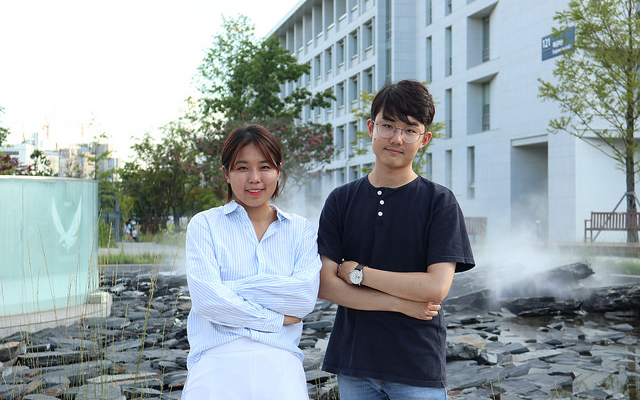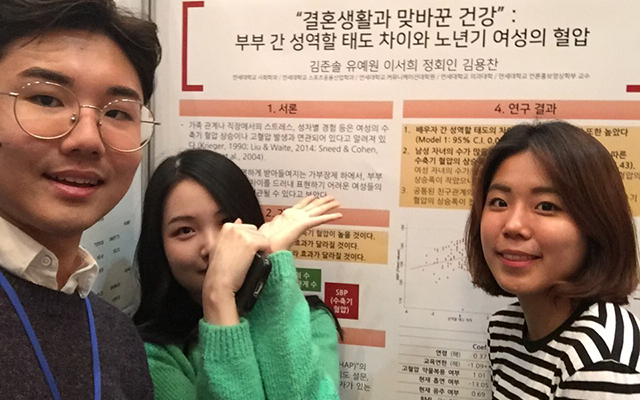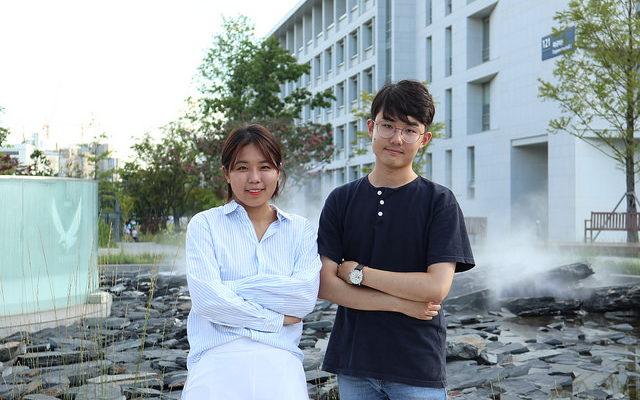- Can Gender Roles Affect Our Health? October 24, 2018
-
Yonsei student “Agenders” research gender roles and health of the elderly

Gender roles can impact all members of society in different ways, but can it even affect the physical health of the older adult population? Yonsei students team up to find the answer.
Team Agenders, a graduate student research team selected by the Junior Convergence Research Group program, examined the relationship between the health of the elderly population and gender role behavior. Comprised of four students: Yoo Ye-won (Sport Industry Studies), Kim Joon-sol (Sociology), Yi Seo-ui (Media Studies and Theory of Communication), and Jeong Hoe-in (Medicine), the Agenders team share their research ideas in a feature interview.
The graduate schools and the Institute of Convergence Science (ICONS) at Yonsei University established the Junior Convergence Research Group program to support innovative research in interdisciplinary themes. Graduate students from various majors are encouraged to strengthen creativity through joint research, meetings, and cooperation. The program was launched to foster a new convergence research culture in the future.
Q. Tell us the story about your team.
A. Our team is called Agenders. We all first met in a class called “Medical Social Convergence Research.” The course involved group presentations and the four of us ended up on the same team. While researching topics for the group project, we found out that our overlapping interest was gender issues, so we named the team Agenders — similar to the Avengers, but dealing with gender issues. There is also the meaning of throwing the agenda of gender issues into society.
We came across the Junior Convergence Research Group announcement from ICONS while doing our research for class. Since the type of research was similar, we decided to do it alongside our coursework and were able to continue our work with ICONS even after the class ended.
Q. What was the topic of your team’s research?
A. We did two kinds of research. The first one is the one we submitted to ICONS.
Our starting point was to research the relationship between the health of the elderly and gender role behavior. The data we obtained for class was gathered from the elderly population living in a village on Ganghwado Island. It contained all sorts of health data, gender role behavior, psychological status, cognitive functions, and social networking data.
Analyzing the data, we discovered that the difference in gender role behavior between spouses affects not the husband, but only the wife. The greater the difference in gender role behavior between the marital couple, the higher the blood pressure of the wife. In other words, if the husband is patriarchal and the wife supports gender equality, her blood pressure rises while the husband is not influenced. Our team presented these findings before the Korean Society for Preventive Medicine.
Furthermore, we also found out that the gender role behavior of friends is also related. If the wife’s friends are likeminded supporters of gender equality and only the husband is patriarchal, the wife’s blood pressure is even higher. We also presented these results at an international academic conference.
The topic of the other research we made was on obesity levels by age group. We looked at the change in obesity levels in men and women from their teenage years until their 60s. Obesity levels in women in their teens and 50s, 20s and 30s, and 60s and 70s, respectively, were moving in the same pattern. These were tied age groups. Currently, the state develops standardized policies for each life cycle, but through this research we found that it would be a good idea to create policies by tying related age groups together. We received a special award for this research.
Q. Why did you focus primarily on gender role behavior in the older population?
A. All of us were quite quick on the decision about gender-sensitive issues. We were very interested in the topic, and when we came up with the keywords “gender issues in the older population,” we all just started working passionately. We did some preliminary research before we delved into the issue, and the need for our research was evident. There were many studies about the relation between the differences in gender role behavior and mental health, but they did not include the impact on physical health. Also, they did not deal with the significance of gender issues and gender roles to the older population. There were no studies that correlated such issues with biomarkers like blood pressure. This is what gave us the motivation to pursue the path of our research.
Q. Is there any special significance of blood pressure as a biomarker?
A. Out of many other biomarkers, blood pressure was an excellent indicator of psychological impact. There is even a thesis suggesting that if you feel psychologically depressed or repressed, this can induce cardiovascular disease. After researching a bit, we figured out that blood pressure would fit well in our research. It is also something that everyone is familiar with, and we thought it would make our research more approachable to the public.

Q. Tell us about the overall research process.
A. The total research period took about a year. We decided on the topic first and then looked at previous research in the relevant field. Joon-sol had a lot of research experience and was good with data utilization, so he took care of the data analysis framework. Hoe-in was in charge of the medical aspect and Seo-ui, and I (Ye-won) worked on data analysis and searching for previous research.
It was the first time for all of us to participate in writing a research thesis actively, and we learned a lot. Professor Kim Yong-chan provided feedback on our data analysis, and all the professors who were part of the class gave us constructive comments.
Q. Any challenges while conducting your research?
A. We did not have much difficulty because we all worked extremely hard. We only argued once while preparing for the final presentation for ICONS. Our opinions were divided on whether we should focus on the direct results from the research or instead on the more general outcomes and implications. But in the end, we managed to resolve differences in opinion (laugh).
Q. How was convergence research different from traditional research?
A. It was the first time we had to take full responsibility for conducting research. We were not part of the support team; instead, we had to do everything from planning to execution. It is not easy to research in that kind of situation with people from entirely different fields who did not know each other beforehand, but we managed to succeed because we all had coinciding interests and opinions. And we all learned a lot together in the process.
Q. Is there anything you hope for after the presentation of the results?
Ye-won: I hope that, through our research results, many people will realize that their marriage and health status may be related. I wish that everyone enjoys a healthy marriage even in old age.
Joon-sol: Although gender issues are hotly debated in society nowadays, I think they are still an unfamiliar topic for many people. I hope people can become more familiar with gender issues with accurate medical news that is relatable and easily accessible.
<Originally published on September 7, 2018>
show mobile menu
mobile menu




